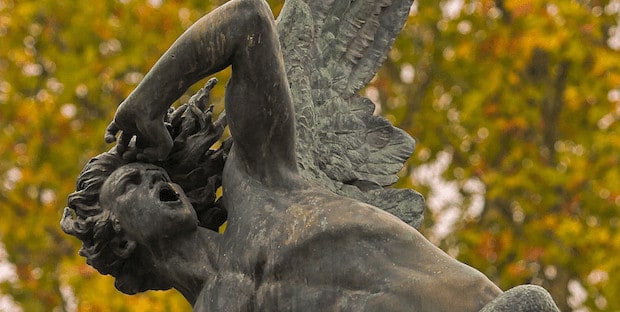Last week we posted about whether Jesus went to hell after his death, and in what sense.
One of the chief passages on this topic is 1 Peter 3:18–20, specifically verse 19: “in which he [the resurrected Christ] went and proclaimed to the spirits in prison . . .”
In his commentary on 1 Peter, Peter David succinctly summarizes various interpretations of who these spirits are, then states his preference and why he holds it. David’s footnotes are reproduced for further reading.
Here are David’s comments on verse 19, lightly adapted for readability:
A number of alternative interpretations have been given.
(1) The spirits are the souls of the faithful of the OT and the “prison” is simply the place they remained awaiting Christ, who proclaims his redemption to them;1
(2) the spirits are the souls of those who died in Noah’s flood, who are kept in Hades, and who hear the gospel proclaimed by Christ after his death and before his resurrection (or heard the gospel in the days of Noah before being put in “prison”);2
(3) the spirits are the fallen angels of Genesis 6:1ff. and the prison is where they are kept bound and hear the proclamation of judgment by Christ (or a call to repent given in the days of Noah);3
(4) the spirits are the demons, the offspring of the fallen angels of Genesis 6:1ff., who have taken refuge or been protected (rather than been imprisoned) in the earth and the proclamation is that of Christ’s (post-resurrection) invasion of their refuge;4 or
(5) the spirits are the fallen angels, but the preacher is Enoch, who proclaimed judgment to them.5
In order to decide among these alternatives, we need to examine the meaning of each term in context in the light of its linguistic background. “Spirits” in the NT always refers to nonhuman spiritual beings unless qualified (as, e.g., in Heb. 12:23; see Matt. 12:45; Mark 1:23, 26; 3:30; Luke 10:20; Acts 19:15–16; 16:16; 23:8–9; Eph. 2:2; Heb. 1:14; 12:9; Rev. 16:13, 14). Thus one would expect it here to mean angelic or demonic beings. Were there then spirits that were disobedient in the days of Noah? A reading of Genesis 6:1–4, especially as used by Jews of Peter’s day, makes it clear that these “sons of God” were associated with Noah and interpreted as angels who had disobeyed God and were subsequently put in prison. In 1 Enoch, for example, Enoch sees a place of imprisonment and is told, “These are among the stars of heaven that have transgressed the commandments of the Lord and are bound in this place” (21:6). Here, then, we have an event that includes all the elements to which Peter refers, spirits (angels, stars, Watchers, and spirits are used interchangeably by 1 Enoch) that were disobedient (“transgressed the commandment of the Lord”) and were therefore put in prison (“This place is a prison house of the angels; they are detained here forever,” 1 Enoch 21:10), all of this happening with relation to the days of Noah.
[. . .]
Thus it seems likely that this passage in 1 Peter refers to a proclamation of judgment by the resurrected Christ to the imprisoned spirits, that is, the fallen angels, sealing their doom as he triumphed over sin and death and hell, redeeming human beings. (Emphasis mine.)
***
What do you think of David’s conclusion? Discuss in the comments below.
- Calvin, Calvin’s Commentaries: Hebrews/1Peter/2 Peter, trans. W.B. Johnston (Edinburgh/Grand Rapids, 1963), pp. 292–95. This explanation breaks down in two places: (1) Calvin must take “prison” in a nonhostile sense, and (2) he has to explain ἀπειθήσασιν in verse 20 as not applying to these spirits, which is most unlikely. Calvin is insightful in putting the preaching after the resurrection of Christ, although he sees Christ as doing this through the Spirit and not in person.
- C.E.B. Cranfield, “An Interpretation of I Peter iii.19 and iv.6,” ExpT69 (1957–58), 369–72; and E. Stauffer, New Testament Theology, trans. J. Marsh (London, 1955), 133–34 [Die Theologie des Neuen Testaments (Stuttgart, 19484), 113–15]; H.J. Vogels, Christi Abstieg ins Totenreich und das Läuterungsgericht an den Toten (Freiburg, 1976), as well as Beare, Goppelt, Windisch, and Wand among the commentators. Most recently the idea of Christ’s preaching to human beings in the time before the flood by means of the preaching of Noah has been defended by W. Grudem, 1 Peter (TC) (Grand Rapids, 1988), 157–61 and 203–39, a rather significant appendix since it forms 16 percent of the commentary.
- First proposed by F. Spitta, Christi Predigt an die Geister(Göttingen, 1890), this position has been followed by many commentators (including Selwyn and Hauck), and J. Jeremias, “Zwischen Kartfreitag und Ostern,” ZNW 42 (1949), 194–201; B. Reicke, The Disobedient Spirits and Christian Baptism (Copenhagen, 1946); W.J. Dalton, “The Interpretation of 1 Peter 3:19 and 4:6: Light from 2 Peter,” Bib 60 (1979), 547–55; Christ’s Proclamation to the Spirits (Rome, 1965). Spitta puts the preaching in the days of Noah; most others put it after the death of Christ.
- J.R. Michaels, 1 Peter, pp. 205–11. Michaels is far from dogmatic about this interpretation, the previous one appearing to be his second choice. But he correctly notes that it fits the idea of the kingdom of God and its invasion of the demonic sphere, which previously was presumably a protected (or at least uninvaded) area.
- E.J. Goodspeed, “Some Greek Notes,” JBL 73 (1954), 91–92. This interpretation includes the idea that Enoch was originally in the text, but is not totally dependent on that conjectural emendation. Cf. his Problems of New Testament Translation. B. M. Metzger, Chapters in the History of New Testament Textual Criticism(Leiden, 1963), pp. 158–59, traces this conjecture back to William Bowyer in 1772.







